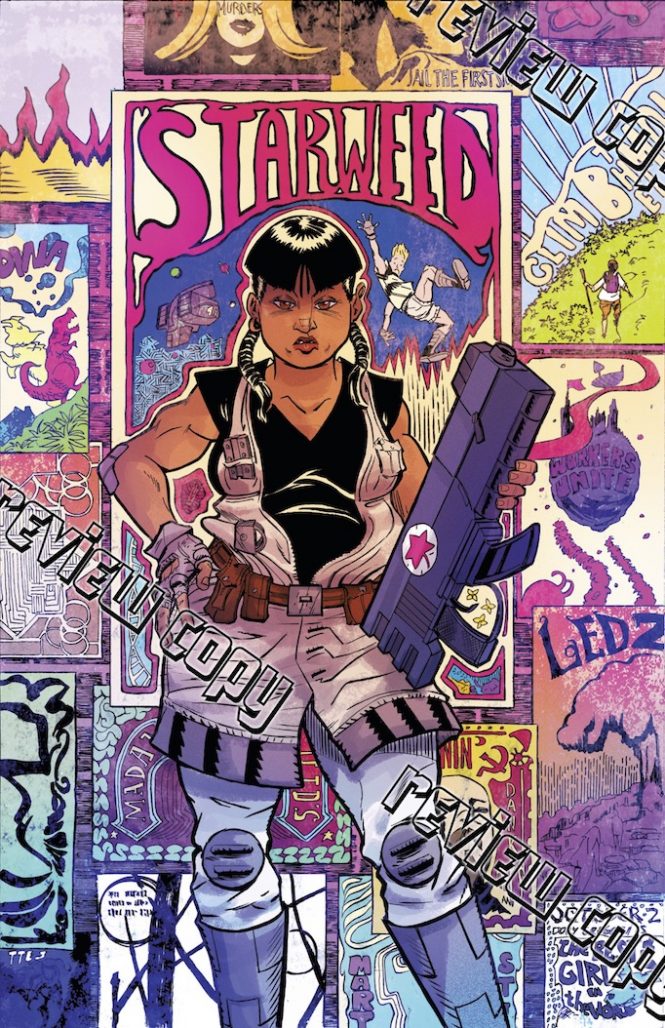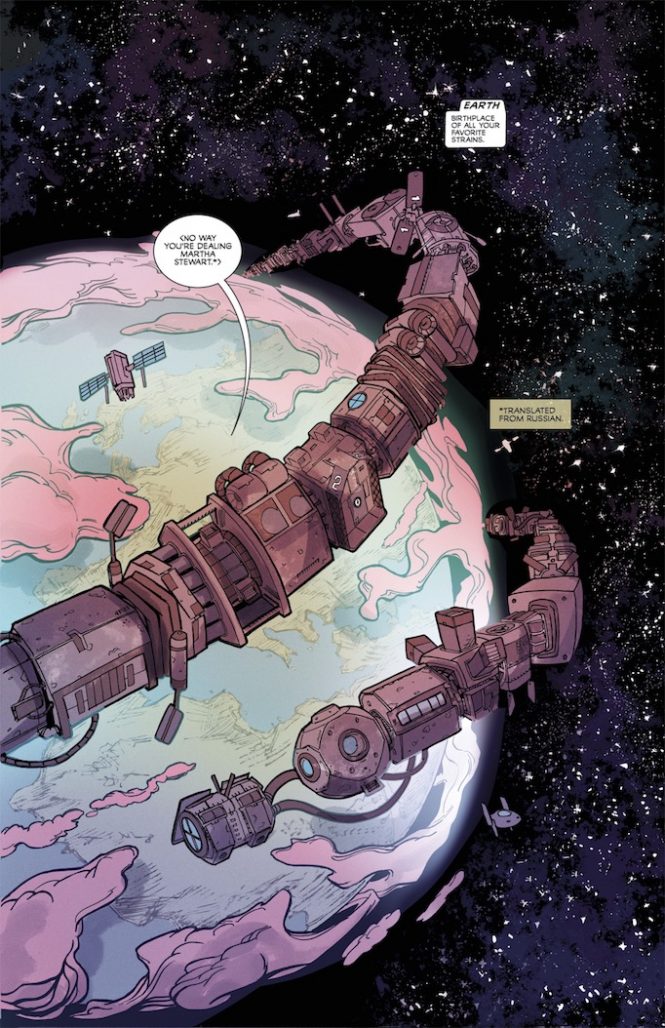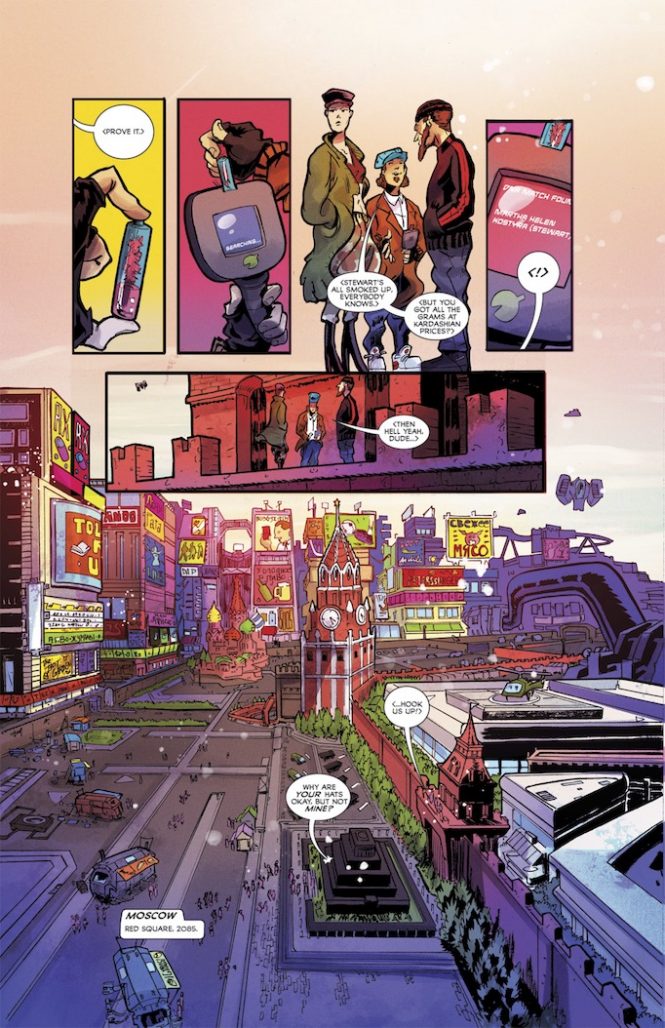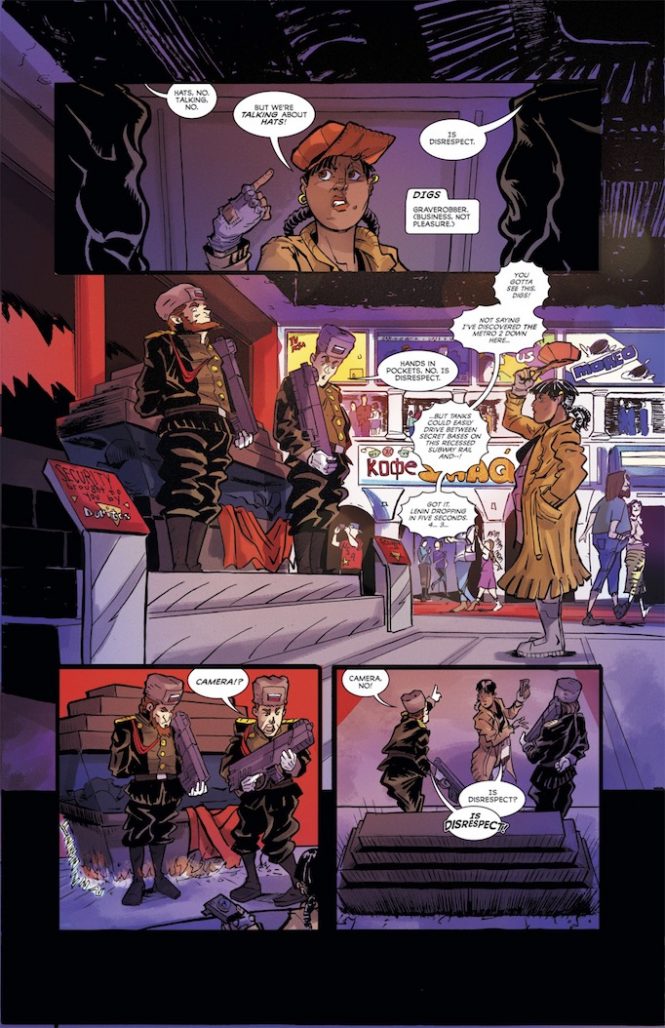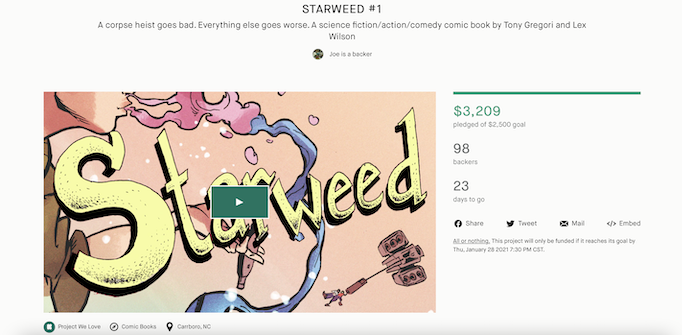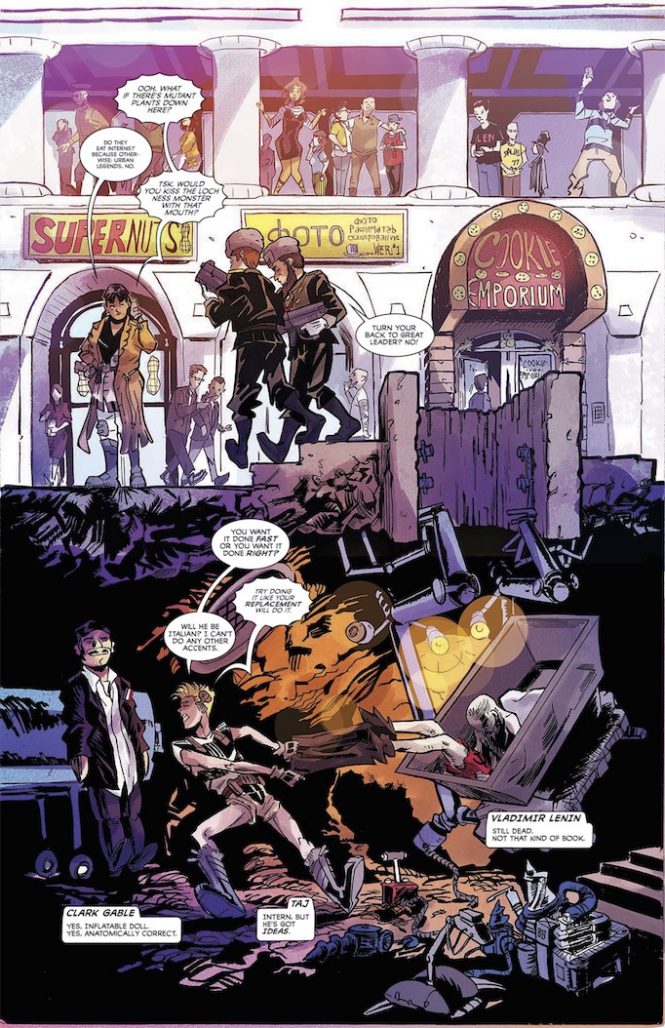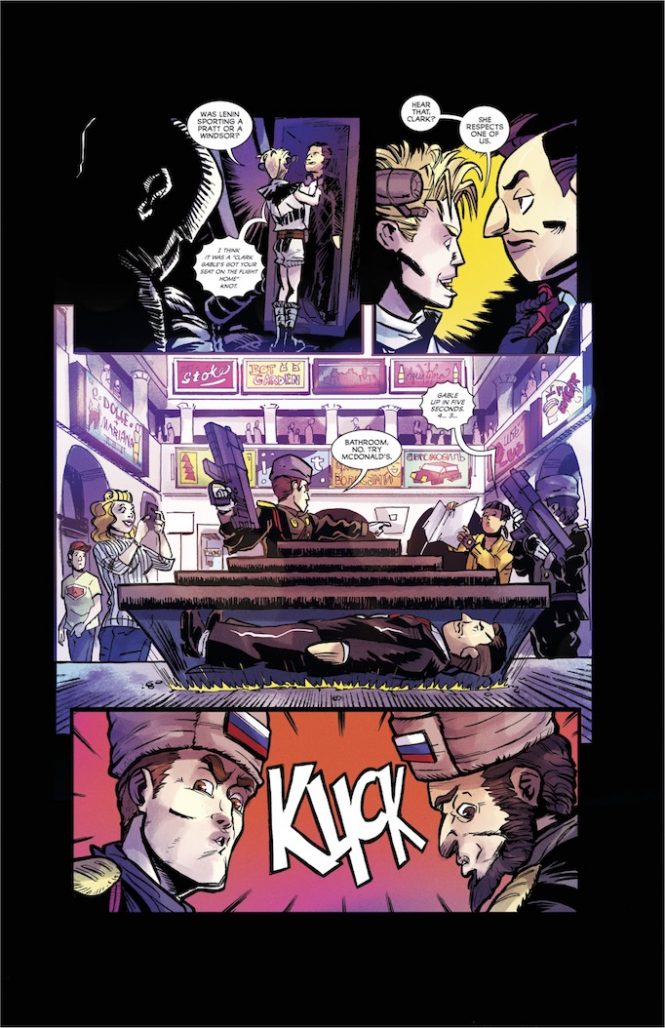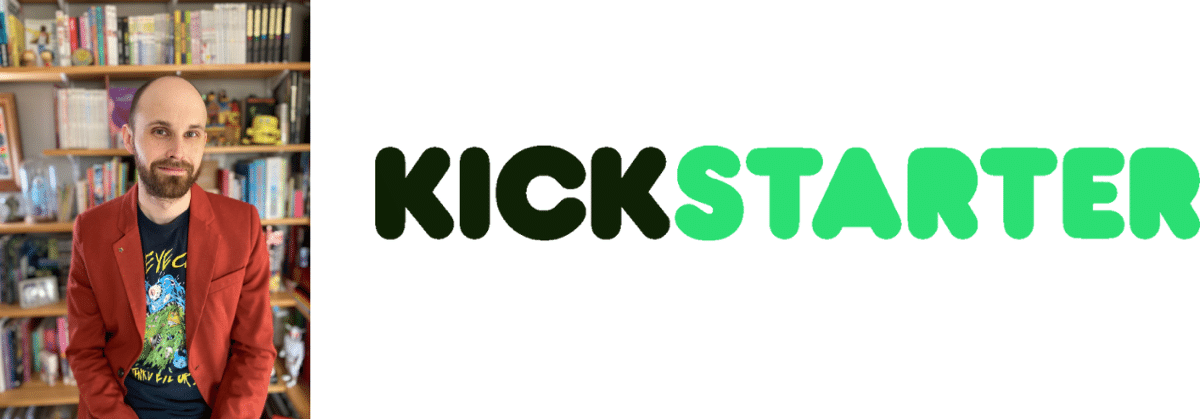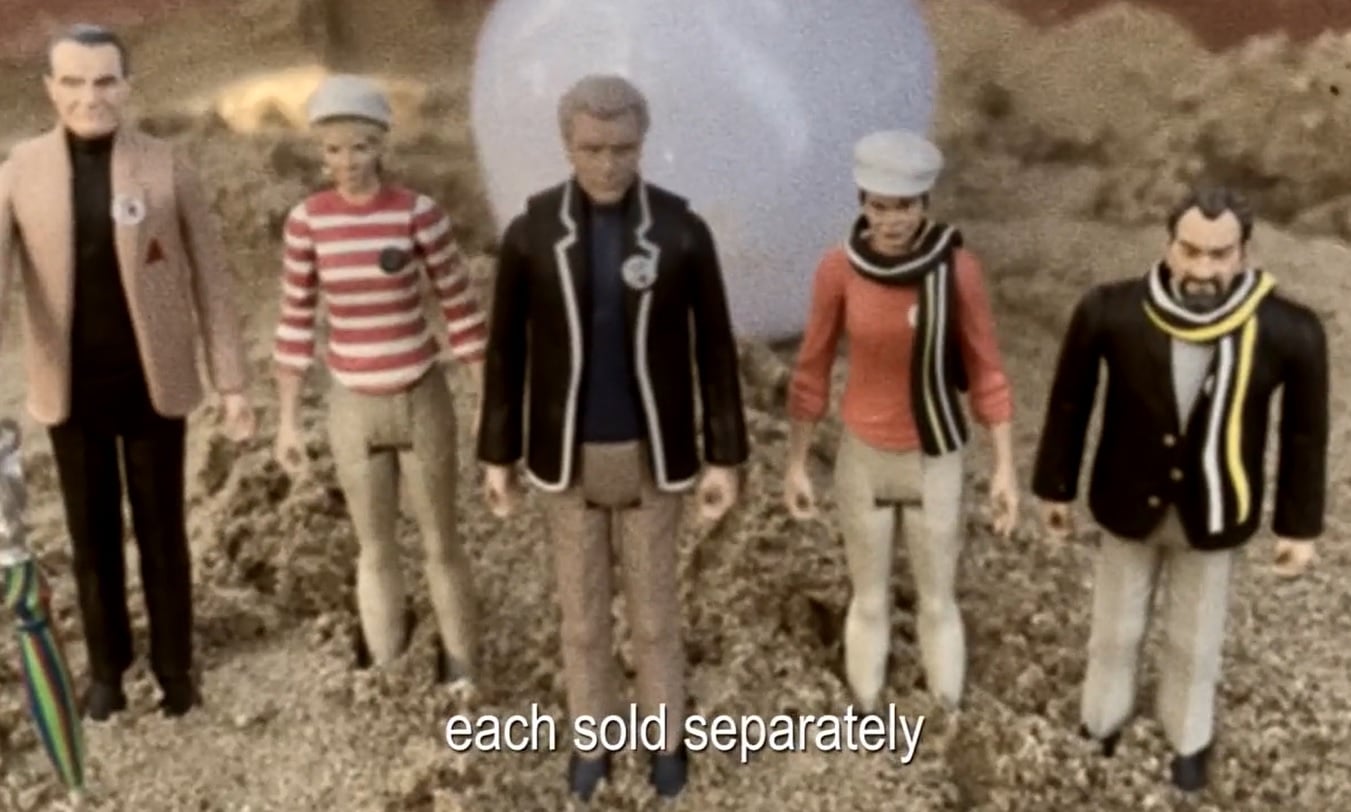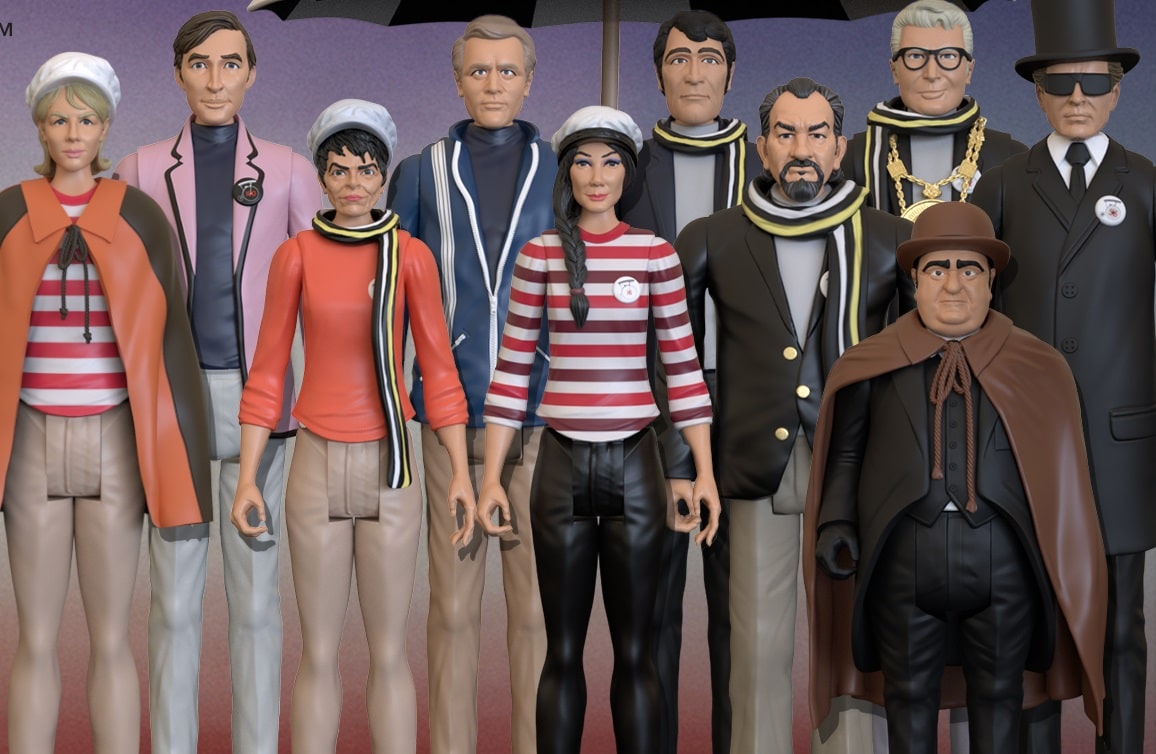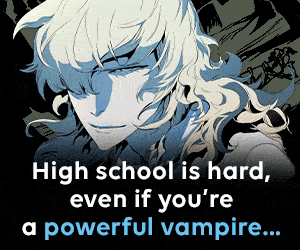I reached out to Lex Wilson all the way back in 2014 about doing an interview because of how impressed I was by his two Kickstarters. His first campaign was a money-losing venture, designed instead to get his comic The Time of Reflection in as many hands as possible. His second was a “Quickstarter” for his comic KLAY, a campaign that ran for only 7 days.
Now he’s back to fund Starweed, a stoner comedy set in space illustrated by Anthony Gregori. I really enjoyed the chance to get to interview them about the series, their collaborative process, and some of the hidden benefits of crowdfunding.
Matt O’Keefe: What came first, the concept for Starweed or the decision to collaborate on a project?
Tony Gregori: Alex reached out to me through the internet with the concept, I was actually at the laundromat the day he sent me the dm! I remember it vividly lol
Lex: Yeah, I came to Tony, whose work I think I first saw on Karma Police, with a script. It quickly became difficult to imagine the story being told any other way.
Matt: What appealed to you both creating a sci-fi stoner comedy?
Tony: I think if you look at my work, from Karma Police to Deuce of Hearts and everything in between, I’ve made a living drawing whacky, fantastical, weird, funny comics. Starweed fits in that niche quite well. Also, I’m a card-carrying cannabis smoker so really there couldn’t have been a better fit!
It’s ironic that Alex isn’t a smoker, and Digs, our protagonist, doesn’t partake in Starweed. It’s like poetry. It rhymes.
Lex: I grew up on Groo the Wanderer from Sergio Aragones, and it’s one of the few comics I stuck with as my tastes changed over the decades. So if comic books have a platonic ideal, for me it’s that mix of action, comedy, and wonder.
I don’t remember which idea came first: the criminal enterprise around stealing and smoking dead celebrities or the title “Starweed.” But that title ended up doing a lot of work. It helped crystallize the story as a science fiction action-comedy and suggested a lot of the types of humor we’d end up embracing.
Oh, and I liked smoking weed when I’ve tried it. But right now I associate it too much with work, writing on a video game in Colorado and more recently filming in Quebec. I’m not experienced enough to know how it’ll affect me and my work. That gave me all the paranoia I needed to not get much more experienced. After the pandemic ends, I hope to return to Colorado recreationally.
Matt: It feels like Tony was given a lot of room to go wild with his art. Was the series full script, Marvel style, or somewhere in-between?
Lex: This might be the last time I ever did full script before approaching a collaborator. But I think one of the ways we worked well together was we genuinely wanted to hear each other’s thoughts about going in different directions. And even on pages where I was annoyingly descriptive and we stuck to the script as written, much of the invention came from Tony.
Like I’m proud of finding blueprints and construction photos of Lenin’s Tomb in an old book and suggesting ways to clarify the action above and below the building. But Tony’s the one who made thousands of decisions extrapolating Red Square as a Times Square with taco trucks and turned my careless, throwaway phrases into reality. Like “drilling equipment” became this rugged set of future heist tools.
Tony: A lot of the unique layout ideas were in the script, Alex had a vision for what the book could look like and he did a wonderful job communicating it. He also wasn’t precious with his ideas and was open to any that I happened to have. Within that I found tons of room to play, his script enabled me to concentrate on designing the world and the characters.
Matt: Lex, how did you give Tony even more freedom with your future scripts for Starweed?
Lex: For good or ill, I had the complete story arc scripted before we started. But we just found out we’ll be doing a new short story in the Starweed universe, so I’m excited to build something together from the ground up.
Maybe freedom comes from trust? As you grow to trust your collaborator, you feel freer to experiment and you look forward to the other person’s risks. I don’t know. Creative partnerships are weird. Tony, what do you think?
Tony: I definitely feel more comfortable with a collaborator as we get to know each other personally. I enjoy the collaborative process, so whenever Alex had an idea I was all ears. Usually drawing a book is done in solitude, and some of the decisions I make are done on the board in real-time, so I need a writer to trust me and my work and Alex had that trust in me.
Lex: And it goes both ways. Like if I ask him “what if there’s a cantaloupe in front of each person’s face like in that Magritte painting?” I need to be able to trust Tony to ask me why and to tell me no and also that it was an apple. That’s at least as important in collaboration as trusting that, sure, he could draw those cantaloupes and they would be thrilling.
Matt: How many issues will Starweed be in total?
Lex: For now we’re telling a complete story in 3 issues, which I think comes out to 100 pages exactly.
Tony: And all 100 pages are drawn!
Matt: What made you decide to fund it issue-by-issue rather than as a graphic novel?
Lex: For readers, this gives them a chance to get to know us, and not have to commit to 100 pages from a team they’re unfamiliar with. For us, we’re building momentum and letting the work be its own best advocate. Also: overshooting our funding goal (which just happened!) could give us the opportunity to complete the remaining two-thirds all the sooner.
Also, I’m particularly proud of how each issue is a satisfying chunk of story with multiple action setpieces. Going for a fun balance between old school “done in one” adventure comics and modern, unrushed serialized story-making.
Matt: You have a really interesting mind for crowdfunding, approaching the model in ways I haven’t seen before. What are some of the advantages of crowdfunding beyond simply funding a project?
Alex: I appreciate you saying that even as Starweed is the most “conservative” Kickstarter of my three.
While it’s clear by now that crowdfunding offers huge opportunities, every Kickstarter is still an experiment. We’re all asking questions like: is this minicomic made by literal ants too small a project to find regular-sized backers? Is Apple’s about-to-be-announced comic book imprint going to be too big a publisher to garner grassroots support?
So one of the broader questions I’m interested in: How can we mitigate the disadvantages of a disruptive business model? I don’t accept that the financial risks should be so heavily on the readers, or that fewer readers should be burdened with increasingly disproportionate risk. I don’t accept that creators must regularly risk burnout for 30-day marketing events. And I especially don’t accept that the price of success for independent creators is to leave local comic book shops behind, after decades of their championing our wares.
The time to encourage Amazon to treat its employees better was before they matured to the point that they no longer had to listen to anyone. Or in our smaller but more awesome world:
What do we wish was true about Diamond’s model before they became the only gem in town? What will we want from crowdfunding when its platforms are so mature that they don’t need to ask their questions anymore? Or to answer ours?
Matt: Tony, what are the advantages and disadvantages of drawing a crowdfunded comic versus one for a standard publisher?
Tony: I’m currently drawing my first series for a “Big 5” publisher, so my experiences with those sorts of situations are limited. And so far my experience with this particular publisher has been wonderful. I can say that generally speaking there’s more creative freedom when you’re crowdfunding and self-publishing, but you have to handle a lot of the promotional stuff yourself, which takes time away from the actual drawing. I guess it’s a give and take.
Matt: Lex, are you interested in making a book at one of the larger publishers someday or do you treasure the independence of crowdfunding your work?
Lex: Ownership is cool. But what I’m passionate about is story.
I’ve written for video games, including a writers room stint on a licensed property. I loved that work. I loved the collaboration. Playing a small part in a grander story. And don’t tell them this, but I’m more into comics than video games.
So sure, I’d be open to pitching something. Or I think I might be a good fit for a comic book version of a Hollywood “punch up group,” where a roundtable of uncredited comedians/humorists throw jokes at a script until the blueberry muffins run out.
Matt: What is it about the comics medium that speaks to both of you as creators?
Tony: To me, comics are the best medium to tell stories. The visual and the written word combined, to make an art form anyone can do, no matter their lot in life. Comics taught me to read, and captured my imagination, never letting go! Also, I love drawing crazy sh*t!
Lex: Tony said it well. Comics are such a part of my thinking process that almost every story idea starts as a comic story or panel sequence in my head. But economics, market realities, and the limits of space-time all conspire to often make a prose novella more practical than telling a similar story as a 500-page graphic novel.
And oh my wow, the collaboration! Coming from a theater background, there’s always been something magical about two or more people coming together to create something. And this COVID-19 year reminds me how meaningful that can be, even when you’re never in the same room with your collaborators.
Starweed quickly became something greater than the sum of Tony’s and my contributions. And then Claudia came along and made it even greater, working mostly with Tony directly. And that’s how theater is too. You’re never in every scene with every other actor, but you’re all in it together.
And then with Lauren’s lettering, we kept discovering new ideas and ways to play. Right now I’m thinking specifically of Taj’s scream during his Doctor Strangelove moment (included in the preview pack/no purchase necessary). It started with “what if we…” and ended with Lauren not only making it work but making it so much fun.
How did all of these people and elements come together and not create a mess? How is it that I am both a part of this project and yet (rightfully) can take no credit for these images or these colors? It’s magic. Please make that legal to smoke in North Carolina.
Follow the creators on Twitter @alexotica and @TonyGregori, and back Starweed on Kickstarter.




